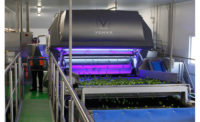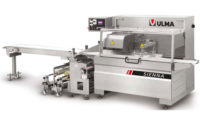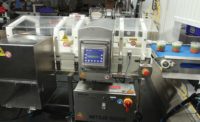Berks Packing provides portion-controlled products thanks to state-of-the-art interleavers
Meat and cheese processors that offer pre-sliced, interleaved, portion-controlled quantities of meat and cheese in ready-to-use formats can significantly improve their position in the industry.

With many foodservice operations tightening costs by discontinuing in-store meat slicing, many of today’s processors now must assume that function. That’s why Berks Packing Co., a Reading, Pa.-based meat processor, took steps to expand its slicing and interleaving capabilities.
Previously, the family owned company offered bulk packaging of ready-to-eat, sliced deli meats. Then, customers began requesting portion-controlled options.
“To manage their costs at the store level, our foodservice and retail customers began to ask us for portion control on the plant side,” says John Buckley, director of operations.
As part of the solution, Berks Packing purchased two high-volume slicers and an interleaver from Packaging Progressions, Souderton, Pa., in order to deliver portion-control sizes. Packaging Progressions specializes in the design and manufacture of automatic, high-speed interleavers, stackers and card dispensers.
“We needed a fast interleaver to keep up with the slicing speed,” says Buckley. “After some research, we turned to Packaging Progressions. Their unit was the only one that could truly handle the high-speed slicing volumes we do while accommodating portion-specific sizing. We are able to meet the portion control needs of our customers. Those who make sandwiches can simply flip over the sliced deli meat on one piece of wax paper to make a sandwich. They know what their meat costs are going into that sandwich. We take care of the slicing and portioning, so it also saves the end user labor.”
With the addition of ProLeaver 20300 interleavers, Berks Packing can handle many sandwich kit portions, including extra-thin shingles and fluffed and folded portions. It’s also able to maximize its slicing capabilities, feeding multiple slicing lines into one flexible system.
With a PLC design enabling easy production setup and changes, the interleavers are capable of handling products of varying shapes, sizes and formats and can operate in a single lane or up to seven lanes, depending upon production requirements.
These interleavers can also be used with automatic counter/stackers for accurate, hands-free counting and stacking. This allows for final visual inspection and simple manual loading into a packaging machine. Alternatively, the stacks can be conveyed to an autoloading system to further reduce labor at the packaging machine.
“The reliability and accuracy of the equipment is critical because we cannot afford production downtime,” says Buckley. “Our customers rely on us for the right amount of interleaved portions within a package, so it is critical that it is correct.”
To achieve maximum speeds and uptime, the interleavers vary from standard industry offerings with unique features such as servo-controlled product and paper synchronization, power-assisted paper unwinds, encoder-enabled positioning for precise placement, debris filtering to prevent false paper feeds and reduce jams, jam detection logic to reduce paper jams and a portion centralizer. These design improvements essentially increase the accuracy and tracking of the items and the inserted paper to achieve high speeds without misfeeds.
“We are running state-of-the-art, best-in-class slicers, but the interleaving, transferring and final packaging all have to be married together for reliability,” says Buckley. “If one aspect is not reliable, it can shut the whole operation down.”
In this regard, interleavers such as the ProLeaver 20300 go beyond simply addressing the need for efficient operation. Ease of sanitary maintenance is also central to the design. For example, stand-off mounted components prevent the trapping of any product scrap, thus improving sanitation. Ground and polished welds further eliminate bacteria harborage points, making cleaning to a microbiological level possible.
Meat and cheese processors that offer pre-sliced, interleaved, portion-controlled quantities of meat and cheese in ready-to-use formats can significantly improve their position in the industry.
Looking for a reprint of this article?
From high-res PDFs to custom plaques, order your copy today!





